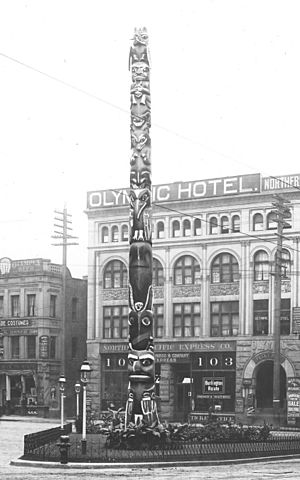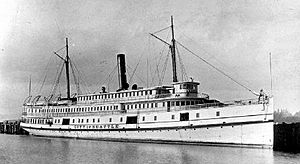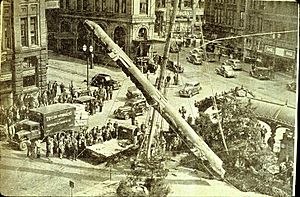Pioneer Square totem pole facts for kids

The original totem pole, circa 1911
|
|
| Location | Pioneer Square Seattle, Washington, U.S. |
|---|---|
| Type | Totem pole |
| Material | Hemlock (original) Red cedar (replica) |
| Width | 4.5 feet (1.4 m) (replica) |
| Height | 49 feet 8 inches (15.14 m) (original) 50 feet (15 m) (replica) |
| Completion date | c. 1790 (original) 1940 (replica) |
|
U.S. Historic district
Contributing property |
|
| Part of | Pioneer Square–Skid Road District (ID70000086) |
| NRHP reference No. | 77001340 |
| Significant dates | |
| Added to NRHP | May 5, 1977 |
| Designated NHL | May 5, 1977 |
| Designated CP | June 22, 1970 |
The Pioneer Square totem pole is a famous totem pole located in Pioneer Square in downtown Seattle, Washington. It is also known as the Seattle totem pole.
This totem pole was first carved around 1790 by the Tlingit people in Alaska. It was made to honor a Tlingit woman named Chief-of-All-Women. In 1899, the original totem pole was taken by Seattle businessmen during a trip to Alaska. They gave it to the City of Seattle, and it was put up in Pioneer Square. It quickly became a symbol of pride for the city.
Later, the totem pole was damaged by fire. A new one was made to replace it in 1940. This new totem pole is now recognized as a National Historic Landmark.
Contents
History of the Totem Pole
Its Tlingit Origin
The original totem pole was carved around 1790. It belonged to the Kinninook family, a group within the Tlingit people. This special pole was created to remember Chief-of-All-Women. She was a Tlingit woman who sadly drowned in the Nass River.
Her family hired a carver to create the pole. They shared stories they wanted shown on it. Once the totem pole was finished, the family held a potlatch ceremony. They raised the pole in her honor in their village on Tongass Island, Alaska. This was one of the few totem poles made to honor a woman.
The Seattle Expedition
In 1899, a newspaper called the Seattle Post-Intelligencer sponsored a trip. Important people from Seattle went on this trip to Alaska. The goal was to explore new trade and business chances. Seattle leaders also wanted to make Seattle known as the "Gateway to Alaska."
On August 17, 1899, 165 people sailed on the City of Seattle steamship. They stopped at many places in Alaska. On August 28, 1899, the ship stopped at a Tlingit village near Fort Tongass. The village seemed empty. Members of the group decided to take a totem pole as a souvenir.
A crew member named R. D. McGillvery helped take the pole. He later said they "chopped it down" like a tree. It was too big, so they sawed it in half. During this, they broke a part of the pole. They also took a carving of a seal. The group paid McGillvery a small amount for his work.
The expedition returned to Seattle on August 30, 1899. The group then gave the totem pole to the Seattle City Council as a gift.
The Totem Pole in Pioneer Square
The totem pole was fixed and repainted. On October 18, 1899, it was raised in Pioneer Square. Many people cheered at the ceremony. City officials praised the gift. They said no one owned the pole and that the expedition saved it.
However, most Tlingit villagers were away fishing. They were shocked to find the totem pole gone when they returned. David E. Kinninook, a descendant of Chief-of-All-Women, and other Tlingit people wanted the pole back. They asked for legal action and money. The Kinninook family even sent people to Seattle to try and get it back.
A legal dispute followed. A judge later allowed Seattle to keep the pole. The group who took it paid a small fine. The Seattle Post-Intelligencer newspaper paid this fine for them.
The totem pole quickly became a symbol of Seattle. It appeared on postcards and brochures. In 1909, Seattle hosted a big event called the Alaska–Yukon–Pacific Exposition. The totem pole was featured on the official brochure for this event. By 1910, people called it "the totem pole that made Seattle famous."
Damage and New Totem Pole
In October 1938, someone set the totem pole on fire. It was also badly damaged by rot. The City of Seattle decided a new one was needed. The United States Forest Service was working on a totem pole project in Alaska. They offered to help. Tlingit carvers from the Civilian Conservation Corps would make a new pole.
The damaged pole was sent to Saxman, Alaska. Tlingit carver Charles Brown led a team of carvers. Members of the Kinninook family were part of this team. The new totem pole was finished in three months. It was made from red cedar.
Because the wood and carvers were from the government, a special law was passed. This allowed the new totem pole to be given to the City of Seattle. The finished pole was blessed by tribal members. It arrived in Seattle in April 1940. It was then raised in Pioneer Square on July 24, 1940.
In 1972, a carver named John C. Hudson, Jr. fixed and repainted the new totem pole. In 1977, this totem pole was named a National Historic Landmark. It shares this honor with the Pioneer Building and pergola in Pioneer Square.
Images for kids






